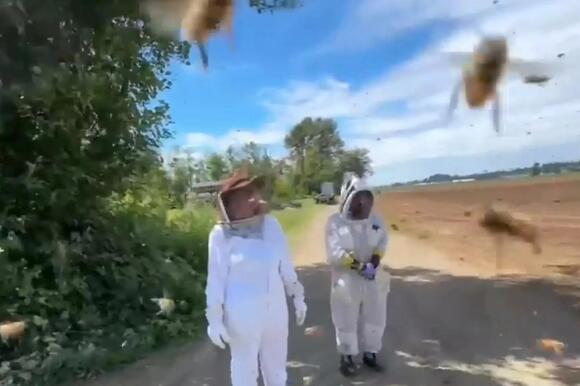A semi-truck transporting approximately 250 million bees in their hives overturned on a roadway in Washington state on Friday, releasing a dense, buzzing swarm of agitated insects.
Fortunately, over two dozen volunteer beekeepers from Whatcom County — located near the U.S.-Canada border — stepped in to help manage the chaotic situation, according to the Whatcom County Sheriff’s Office.
The beekeepers worked to recover and restore the dislodged hive boxes, which were then returned to use. “Hive boxes from the overturned truck were recovered, restored, and returned to use,” the sheriff’s office reported in an update Friday afternoon. “By morning, most bees should return to their hives, and those overseeing the shipment will take over.”
Initially, authorities expressed concern that it might take days to round up the bees and advised residents to be cautious. “The plan is to allow the bees to re-hive and locate their queen,” the sheriff’s office explained. “That should happen within the next 24 to 48 hours. The goal is to save as many bees as possible.”
Katie Buckley, the pollinator health coordinator for the Washington State Department of Agriculture, said that many bees are expected to survive the ordeal, reunite with their hives, and eventually continue their journey.

“Bees are actually surprisingly resilient,” she told Seattle’s NBC affiliate KING.
Still, officials urged the public to avoid the area near the crash, noting that the bees — likely stressed and disoriented — might not be in the best mood. “They’re probably having a bad day,” Buckley added.
The sheriff’s office noted that the roadway could reopen by Saturday morning, when the beekeepers responsible for the shipment are expected to resume control.
While the bees’ final destination remains unknown, KING reported it was working to find out more. The cause of the crash has not yet been disclosed.
In a statement, the sheriff’s office expressed gratitude for the “wonderful community of beekeepers” who helped ensure the safe recovery of millions of essential pollinators.





